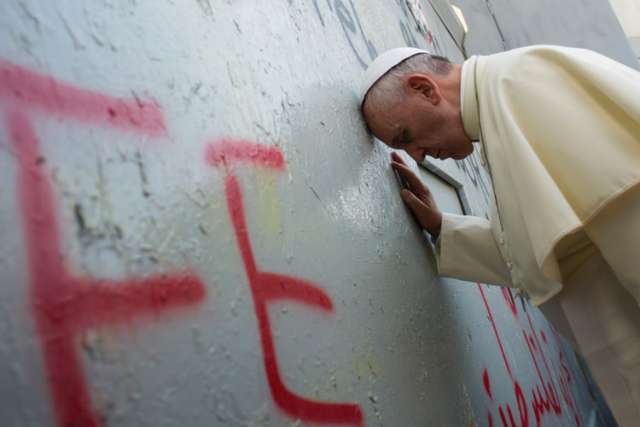Dimant is incensed because Pope Francis stood in silent prayer in front of Israel’s security wall which surrounds much of Bethlehem.
“The Pope could not have chosen to insult the Jewish people with any greater gesture. What an insult to the victims of Nazism. What a mockery of history,” Dimant writes in the Jewish Tribune, Canada’s most read Jewish newspaper. Dimant is the publisher.
In part he is angry because graffiti near where the Pope stood compared the security wall to walls which surrounded the Warsaw Ghetto during the Second World War.
“The Pope gave the Palestinians an iconic photo, an iconic symbol,” Dimant told The Catholic Register. “The fact that there were murals that depicted Jesus as a Palestinian with a keffiyeh (the Arab headscarf often associated with Yasser Arafat and Palestinian resistance), rewriting the very history of the Old
Testament, and the Pope did not object to that, that’s very painful.”
Dimant’s rhetoric fails to recognize the accomplishments of Pope Francis’ visit, said Fr. Tom Rosica, Salt + Light TV CEO and assistant to the Holy See press office. In particular the Pope’s invitation to Israeli President Shimon Peres and Palestinian President Mahmoud Abbas to pray at his home in the Vatican represents hope for peace in the region.
“The fact that both leaders accepted immediately to come to Rome for Pentecost Sunday for the prayer service is another indication as to why previous peace efforts may have failed — because their starting point was not prayer,” Rosica said.
Dimant’s talk of 1,700 years of Jewish oppression diverts attention away from present realities and hopes for the future.
“It is unfortunate that Mr. Dimant does not move beyond age-old rhetoric and open his eyes to see the incredible significance of the recent papal journey,” Rosica said.
It is unthinkable that the Pope and the Church he leads would not express solidarity with the Palestinian people, said Rosica.
“Because the bulk of the Church in that area is Arab and Palestinian, the Church is concerned with her own people and their future,” he said. “They are clearly a minority and the Church is concerned with their future and their well-being.”
Pope Francis’ May 24-26 visit — which included a stop at Jerusalem’s memorial to the victims of terror, a wreath-laying ceremony at the grave of Theodore Herzl, founder of modern Zionism, and a tour of the Yad Vashem Holocaust memorial — builds on previous visits by Pope Benedict, Pope John Paul II, Pope Paul VI and on the teaching of the Second Vatican Council about the unbroken covenant between God and the Jews, said Rosica.
“This visit follows in that great succession and moves all parties forward on the journey to a lasting justice and peace,” he said.
Dimant’s objections go beyond the symbolism of the Pope praying before the three-metre high concrete security wall. He is also angry that Pope Francis acknowledged Palestine as a state. In 2012 the United Nations voted 138 to nine to recognize the State of Palestine as a non-member observer — the same status which the Vatican holds.
“Nowhere, with great respect, does it say in the Old Testament that the Jews will carve out land that God has given them to create a Palestinian state,” said Dimant. “I don’t believe the Pope will find that phraseology.”
Dimant said the wall has saved thousands of Jewish lives and the Pope should not have allowed it to be used as a symbol of Palestinian suffering or of Israeli occupation.
“In Argentina of course he was a very close friend of the Jewish community. He attended many of the B’nai Brith meetings remembering the Holocaust. Was he taken in by members of the curia? By people who are sympathetic to the Palestinians and anti- Israel? Perhaps,” Dimant said.
Other Jewish assessments of the Pope’s journey were less vehement.
“Trips of this nature are high profile and fraught with challenges,” said David Koschitzky, Centre for Israel and Jewish Affairs chair, in an e-mail. “Overall, we were pleased with the visit, despite the inclusion of a number of elements that concerned and disappointed us, including a photo opportunity beside the security barrier, a structure that has saved countless Israeli lives.”
Koschitzky calls Pope Francis “a good friend of the Jewish community” who “has demonstrated remarkable solidarity with the Jewish people.”
While Dimant’s view of Israel and its relationship with Palestine has supporters within the Jewish community, it’s not shared universally, said Canadian Jewish News editor Yoni Goldstein.
“Most people on the centre or the centre-right very much accept the idea of a Palestinian state. Some would welcome it as well,” he said. “But one that would live peacefully and co-exist with Israel as well.”


